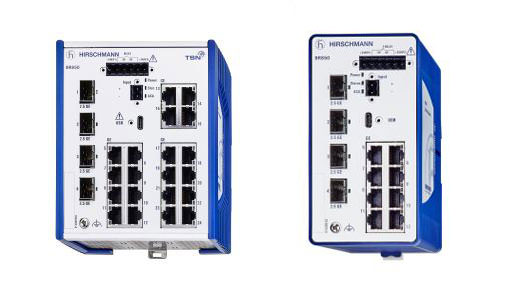TechnologyMarch 14, 2023
Ethernet & TSN – switching connectivity up a gear

Time-Sensitive Networking (TSN) is an enabling technology and a vehicle for broader change in industrial networking, as it consists of meaningful enhancements that prepare Ethernet for next-generation applications.
Its key benefit is its ability to facilitate the creation of open, unified, convergent architectures that provide the opportunity to realise vast productivity improvements.
Thus, it is no surprise that compatible, certified network switches have already been released. To leverage the complete value proposition of TSN, it is essential for end devices as well as infrastructures, to support this technology.
Thomas Rodenbusch-Mohr, Product Cluster Manager at CC-Link Partner Association (CLPA)’s partner Hirschmann Automation and Control GmbH – a Belden Brand, discusses the benefits of TSN and why the company is offering compatible products.
Convergence is most certainly a core aspect of future-oriented smart applications in a variety of sectors, from manufacturing to transportation and energy automation. TSN can enable this, with its ability to deliver highly deterministic communications within standard, vendor-neutral Ethernet.
Thomas Rodenbusch-Mohr explains: “TSN can distinguish traffic, assigning priority levels to individual data packets and sending each stream over the network accordingly while observing their individual timing constraints. This means that TSN can cater to even the highest real-time communications demands of industrial automation applications.”
In particular, TSN can support the integration of information technology (IT) and operational technology (OT). “This innovation supports network convergence by allowing users to merge IT and OT traffic on the same wire, while still satisfying their individual communications requirements. In effect, a key added benefit that TSN brings to industrial applications is the ability to drive the unification of networks that were, out of necessity, kept separate in the past. This affords a reduction in network complexity and capex investment. More importantly, the broader technology change that comes alongside TSN enables the creation of open network architectures. This will reveal a real treasure trove of information that data scientists can leverage to support Industry 4.0 and smart applications. By making this information seamlessly accessible directly from the source, there is no need for gateways in between,” Thomas says.
Additional features of TSN that are of high value to users, automation and machine vendors include backward and forward compatibility, which makes it possible to integrate existing and future Ethernet devices in TSN-capable networks with suitable, comprehensive migration paths. Further to this, the newly introduced TSN mechanisms are additions to the Ethernet toolbox. Hence, they offer the same network architecture flexibility and bandwidth scaling of traditional Ethernet.
Creating the Connected Industries of the future
These competitive advantages are the foundation of cost-effective, cutting-edge networking capabilities. Factory and process automation are perhaps the fields that can benefit most from TSN technology and the changes it can bring. Thomas adds: “For example, you can have critical traffic, like motion control, with precise real-time demands and traffic without real-time demands, such as bandwidth-consuming file transfers, running simultaneously on the same network without interfering with each other.“
“Ultimately, network convergence enables distributed real-time control. As a result, complex machinery and numerous robots can interact with each other with higher precision and flexibility than previously possible. Organisations can also advance key applications, such as predictive maintenance, that require the analysis of substantial volumes of sensor data. An open and converged network from the Cloud to shop floor sensors also provides secure access to perform maintenance and other tasks remotely.”
Besides, TSN offers highly accurate time synchronization (IEEE 802.1AS) and mechanisms to control bandwidth utilisation. These can be extremely relevant in discrete applications as well as within process automation networks, providing accurate time for applications based on sequences of events.
Seizing the opportunity
Belden and its brand Hirschmann were among the first adopters of TSN to futureproof their products and customers’ systems. Thomas observes: “Belden is constantly pushing the boundaries of technology and, with this goal in mind, was among the standardisation initiators of TSN at the IEEE in the early 2010s. With products built on the strong foundation of standard Ethernet, TSN is a natural fit to Belden’s portfolio, which comprises market-leading industrial networking solutions that are used in the most challenging environments.”

Belden’s RSPE and BOBCAT Managed DIN-Rail switches
When looking at developing their first TSN-compatible products, Belden’s RSPE and BOBCAT Managed DIN-Rail switches, the company selected CC-Link IE TSN as its underlying technology, the first open gigabit industrial Ethernet with TSN functions. “Of course, the fact that the CLPA offered the first industrial TSN profile available for certification played a prominent role in our decision. In addition, the organisation made good use of the new TSN additions to the Ethernet toolbox and selected the appropriate mechanisms to provide suitable communications over a vendor-neutral networking technology. This forward-looking vision empowered the CLPA to be ahead of many others with regards to specification and certification.
“In practice, it offers the most advanced ecosystem of TSN-compatible devices and controllers as well as clear migration paths for existing devices in CC-Link IE TSN networks. These features give vendors a unique opportunity to certify and upgrade their product portfolios with the technology while helping machine operators smoothly transition towards complete TSN-capable environments. In addition, CC-Link IE TSN offers low complexity configurations and early certification routes,” summarises Thomas Rodenbusch-Mohr.
He concludes: “There are three main advantages of being part of this association: visibility as a leading automation provider, market entry and community access. In effect, we are able to leverage a strong, established ecosystem of interoperable solutions as well as engage in key discussions with other industry players. This is key to understanding the most relevant technology requirements and provides insights as well as get early feedback on products to improve their development.
Thanks to these elements, we can continue to move forward and serve our customers with a state-of-the-art offering.”

